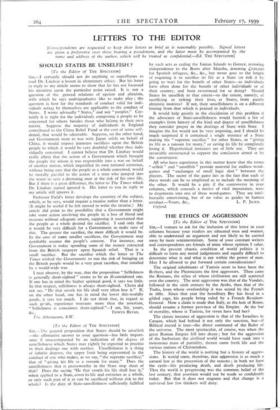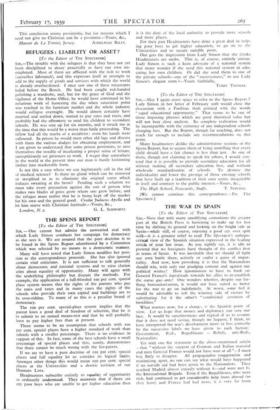THE ETHICS OF AGGRESSION
[To the Editor of THE SPECTATOR] SIR,—I venture to ask for the inclusion of this letter in your columns because your readers are educated men and women, able to understand an argument and not likely to be carried away by mere sentimentalism. Some of your constant writers and correspondents are friends of mine whose opinion I value.
In the present chaotic condition of world politics it is difficult to form any moral judgements and equally difficult to determine what is and what is not within the power of man. May I be allowed to put forward certain considerations?
The original inhabitants of Tunisia seem to have been the Berbers, and the Phoenicians the first aggressors. Then came the Romans, the relics of whose civilisation are still scattered over the country. The next aggression was that of the Vandals, followed in the sixth century by the Arabs, then that of the Turks, from whose overlordship it was seized by the French in 1881. Since that year the hereditary Bey has lived in a gilded cage, his people being ruled by a French Resident- General. Now a claim is made that Italy, as the heir of Rome, should resume a former province of the Empire. At the bar of morality, whose is Tunisia, for seven have had her?
The classic instance of aggression is that of the Israelites in Canaan, which had behind it not only the sanction, but—if Biblical record is true—the direct command of the Ruler of the universe. The most spectacular, of course, was when the great Roman Empire fell into decay ; but for the aggression of the barbarians the civilised world would have sunk into a monstrous mass of putridity, thence came fresh life and the various nations of Christendom.
The history of the world is nothing but a history of aggres- sions. It would seem, therefore, that aggression is as much a natural law as the procession of the seasons ; in both we have the cycle—life producing death, and death producing life. That the world is progressing was the common belief of the last century, that assertion would not be made so confidently today. But that it does not stagnate and that change is a universal law few thinkers will deny. This conclusion seems pessimistic, but for reasons which I need not give no Christian can be a pessimist.—Yours, &c.,
Manoir de La Trinite, Jersey. ATHELSTAN RILEY.











































 Previous page
Previous page